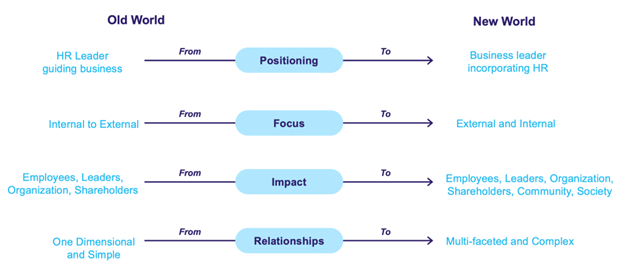Becoming the CHRO of tomorrow: Essential skills for today's HR Leaders
- 6 Min Read
As the new world of work emerges, the CHRO role is undergoing an existential re-evaluation of its scope, focus, and value. These challenges will require a significant shift for the CHRO of the future. Accordingly, today’s HR leaders must develop five domains of expertise to become tomorrow’s strategically impactful CHROs.
- Author: Dieter Veldsman
- Date published: May 3, 2023
- Categories

The Covid-19 pandemic provided HR with a significant opportunity to reposition its prominence and value to drive business success. CHROs took center stage, and Boardroom discussions focused on well-being, people-centricity, and engagement. For some, this move into the spotlight was long overdue. For others, this coincided with their first invitation into the executive suite and the new experience of yielding decision-making power.
Undeniably, many CHROs rose to the occasion and guided their organizations through the unprecedented crisis. As organizations adapt and deal with the complexity of a looming recession, constricting economy, political instability, and social crisis, the CHRO will again be tasked to step up to the plate. We must prepare the HR VPs and Directors of today and develop the skills they will need to shoulder this responsibility.
The need for a different type of CHRO
In the past, the CHRO narrative focused on “securing a seat at the table” or, at best, “taking care of the table at the top.” As the new world of work emerges, the CHRO role is undergoing an existential re-evaluation of its scope, focus, and value. We are entering a world in need of a more humane and principle-led approach that cannot only consider the organization’s needs but can act as a catalyst to restore employee/employer trust, balance productivity with well-being and solve the growing skills and leadership crisis.
These challenges will require a significant shift for the CHRO of the future, which we label as the shift from the old to the new world.
The journey to becoming the new world CHRO will not be without its challenges, and there are three fundamental shifts any aspiring CHRO will have to navigate.
1. The shift from an internal to an external focus
The scope and focus of the old-world CHRO were primarily internal to the organization. The role represented the organization in external matters, yet these were always on behalf of organizational interests. The new world CHRO will need to balance organizational interests with those of communities and societies. This includes an increasing focus on environmental, social, and governance challenges (ESG). Organizations will be held to a higher standard in terms of environmental and social impact. The new world CHRO will have to balance often conflicting agendas considering a more complex stakeholder environment.
2. Reshaping the CHRO relationship with the Board
The emerging world of work poses significant challenges related to hybrid work models, new talent markets, skills shortages, and inclusion. With significant advances in technologies such as artificial intelligence, the new world CHRO will need to guide the Board in making responsible decisions on how the organization can unlock these opportunities in a way that is to the benefit of the organization and its employees.
In the past, the CHRO relationship with the Board was often focused on remuneration, executive talent, and ethics issues, with the CEO playing a critical influencing role. In the future, the CHRO role must increase the time spent with the Board and secure a stronger voice on the agenda. This needs to be done in collaboration with other C-suite leaders. However, the CHRO needs to find their own identity and voice.
3. Repositioning the CHRO role within the C-suite
Within the C-suite, the new world CHRO must reposition the role’s scope, value, and focus. For years, there has been a divide between the CHRO and other executives. In some environments, this was due to the perception that the CHRO executive position was a necessary evil. In others, this was due to the perceived value and influence of the individual in the role on organizational performance.
The new world CHRO needs to become a trusted member of the inner circle of the C-suite. The role will need to become an equal contributing member with the same level of credibility as the COO and CFO. They must be seen by the CEO as a valued confidant to influence the broader leadership team. In this role, the CHRO must become the voice of reason to guide a more humane approach towards critical decisions, They must responsibly show a path forward that benefits the business and the employees impacted.
How do we develop this next-generation CHRO?
Navigating these shifts will require a different skill set. Based on research with 300+ clients across 100 countries over four years, any aspiring CHRO will need to master five core domains of expertise that complement the traditional HR specialization areas.
1. Business Acumen
Even though this is nothing new, HR leaders need an increasing ability to deal with the complexities of the external environment in terms of macro-trends such as climate change and political instability. They require a higher level of proficiency in this domain. The future CHRO will need to equip themselves to help the business make sense of these changes. They must develop their understanding of how these changes impact the organization and chart a way forward.
2. Data literacy
Data literacy is crucial for HR leaders to gain insights to drive business decisions. For the aspiring CHRO, the focus here should be on sense-making, interpretation, and utilizing data to lead evidence-based decision-making practices.
3. Digital agility
The future CHRO needs to be digitally agile. This implies an openness to experiment with new solutions and being able to drive value through technology. There is also a responsibility to create the capacity within the organization to leverage the opportunities that digital provides by driving changes in mindset, skillsets, and toolsets.
4. People advocate
Fourth, the future CHRO needs to act as the people advocate. Again this is not new, yet an increased focus on building human-centric organizational cultures that promote productivity and well-being, navigate change, and hold the organization to ethical and sustainable standards should be a key area of focus for the HR leaders of today.
5. Delivers impact
The final development area is a key focus on understanding how to drive tangible impact through results. Practically this will require a more focused ability to lead and manage large-scale projects, solve problems and navigate the increasingly complex stakeholder environment. This domain also includes the ability to build networks and relationships. Lastly, the capability to deal with conflict and diffuse complex situations into actionable outcomes.
Where do we go from here?
We are standing at a crossroads. On the one side, a new future where the CHRO role will flourish, break free of the inhibiting perceptions of the past, and find a new purpose. On the other, a position that will yet again be relegated to fighting for the seat at the table. There is a window of opportunity, and it is up to us to grasp it.











